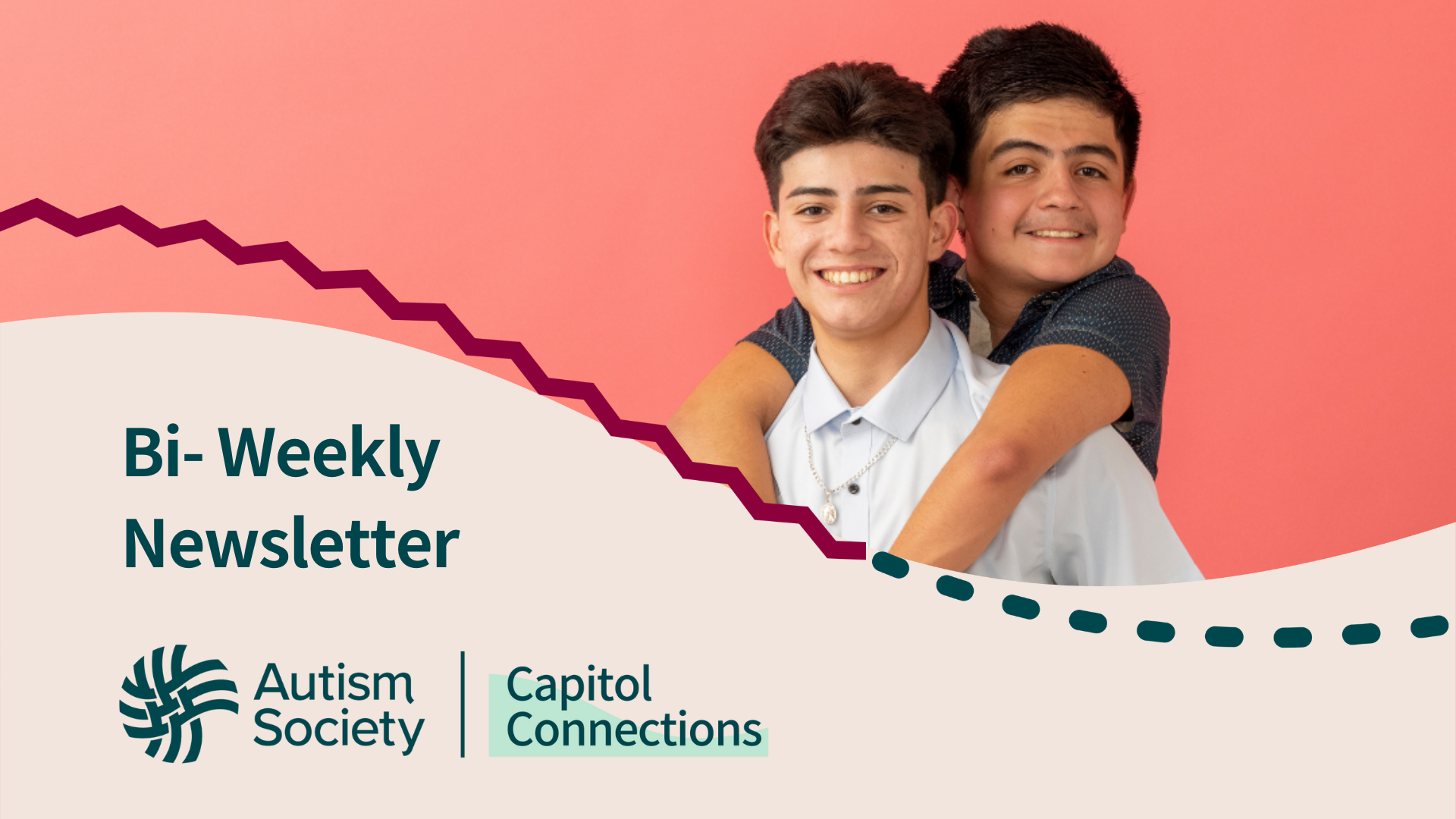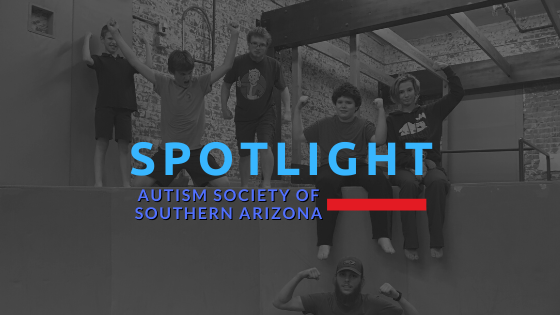
In this issue of Capitol Connection, the Autism Society’s policy newsletter, updates regarding appropriations and continuing advocacy for the Build Back Better plan are included. In addition, reports on employment statistics, autism care, and autism rates are discussed. Remember, the Autism Society’s Action Center provides easy steps for advocates to educate Congress about these and other issues impacting the Autism community.
Appropriations Update
Earlier this month, President Biden signed into law a continuing resolution (CR) to fund the government through February 18. There continues to be a risk of a full-year CR as the Senate has yet to pass any of the 12 annual appropriations bills. This would be harmful since it would prevent the desperately needed increases to programs that support people with Autism and families that were passed in the House bill (See Center Budget analysis). For example, the House bill provided a 40% increase in funding for programs within the Department of Education to address glaring inequities resulting from the pandemic. It also provides an 11% increase for housing that funds 200,000 additional housing vouchers to address the affordability crisis. The Autism Society will continue to advocate for Congress to pass the annual appropriations bills with the highest possible funding levels for programs that support Autism families.
Build Back Better
The policy team continued to advocate for the Build Back Better Act which includes historic investments in programs that will positively impact people with autism and their families. On November 19, the House of Representatives passed its version of the bill. Please see the latest edition of Capitol Connection for a summary of the disability-related provisions in the bill. The Senate is now preparing to take up the bill. Senate Committees released text over the weekend (see HELP Committee text and Finance Committee text). Senate Majority Leader Chuck Schumer (D-NY) must secure the support of every Democratic senator to advance the bill. Action is expected before the new year.
Numerous grassroots organizations joined together to bring attention to the need to pass this bill. Last week Caring Across Generations led an effort to bring grandparents to the Hill to rally for the bill’s caregiver provisions. A children’s rally was held yesterday to highlight the need for child care and nutrition provisions. In addition, on Monday Senator Bob Casey (D-PA) and Debbie Dingell (D-MI) rallied individuals with disabilities and families in a virtual rally encouraging supporters to urge action of their Senators.
Nicole Jorwic, Caring Across Generations, addresses rally participants on Capitol Hill
The Center on Budget and Policy Priorities released a new analysis regarding how the BBB is paid for and how it impacts the deficit. This report can be used in your advocacy efforts.
The Autism Society met with numerous targeted members of Congress to educate them about the needs of people with autism, especially urging the highest possible funding for the Medicaid home and community-based services provision.
Education
Listening Sessions
The Office of Special Education and Rehabilitative Services (OSERS) Assistant Secretary, Katy Neas, is conducting a series of listening sessions with various stakeholders to discuss the needs of students with disabilities, teachers, and related services professionals across the country. Last week, the Autism Society was invited to join one of the listening sessions for the Consortium for Citizens with Disabilities (CCD). CCD leaders described some of the struggles experienced by students with disabilities during the pandemic, the teacher and related service personnel shortages, mental health needs, youth transitioning to work, and postsecondary education, among other topics. The Assistant Secretary was actively engaged in the discussion and noted a number of activities underway within the Department to try to address many of the issues brought up in the meeting.
New OSEP Director
On Monday, the Department of Education announced that Valerie Williams became the Biden administration’s director of the Office of Special Education Programs. Williams previously served as the senior director of government relations and external affairs for the National Association of State Directors of Special Education. She was also a member of the Autism Society’s Public Policy Committee. The Autism Society wishes her the all the best in her new role!
Organ Transplant Discrimination Prevention Legislation
On December 2, Senators Rubio (R-FL) and Hassan (D-NH) introduced the Charlotte Woodward Organ Transplant Discrimination Prevention Act (S. 3301). This is a companion bill to the one introduced in the House in February 2021 by Reps. Jaime Herrera Beutler (R-WA) and Katie Porter (D-CA) (H.R. 1235). The Charlotte Woodward Organ Transplant Discrimination Prevention Act prohibits discrimination based solely on disability before, during, and after an organ transplant procedure. The bill reinforces and supplements rights established or supported by existing civil rights laws such as the Americans with Disabilities Act, Sec. 504 of the Rehabilitation Act of 1973, and Sec. 1557 of the Affordable Care Act. For more information, please visit the NDSS Toolkit dedicated to advocating for this bill.
Social Security Legislation
On December 7, the House Ways and Means Subcommittee on Social Security, Chaired by Rep. Larson, held a hearing on Chairman John Larson’s (D-CT) revised Social Security 2100: A Sacred Trust bill. Social Security disability and survivors benefits are crucially important to the people with autism and other developmental disabilities and their families. This bill includes a fix to the long standing benefit cliff for people with disabilities who try to work (Sec. 107). The entire bill would make our Social Security system stronger for everyone, including 10 million children, adults, and seniors with disabilities across the United States who rely on this fundamental program.The hearing is archived on the House Ways and Means Committee website.
Executive Order on Transforming Service Delivery
On Monday, the Biden-Harris Administration announced a series of new actions to help improve customer experience and Government services for the American people. The new Executive Order directs Federal agencies to put people at the center of everything the Government does and includes 36 customer experience (CX) improvement commitments across 17 Federal agencies, all of which aim to improve people’s lives and the delivery of Government services. The Executive Order also creates a sustained, cross-government service delivery process that aligns to the moments that matter most in people’s lives. The Autism Society hopes that these efforts to remove barriers and utilize universal design will create better access for people with Autism who benefit from federal programs. (see the Washington Post coverage).
Employment
The Bureau of Labor Statistics’s November jobs report announced the unemployment rate fell by 0.4 percentage points to 4.2 percent. According to the Office of Disability Employment Policy, November marked the fourth consecutive month of employment gains for people with disabilities (see the nTide November 2021 Jobs Report for more information).
CDC Surveillance
On December 2, the Centers for Disease Control and Prevention (CDC) released data showing that autism rates are once again rising among children. The new data says that 1 in 44 children in the U.S. is on the autism spectrum or 2.3% of children. Learn more about the report through the Autism Society’s statement.
Housing
Last week, the U.S. Department of Health and Human Services (HHS) and the U.S. Department of Housing and Urban Development (HUD) announced the expansion of a partnership established earlier this year to improve access to affordable, accessible housing and the critical services that make community living possible. The Housing and Services Resource Center will implement a federally coordinated approach to providing resources, program guidance, training, and technical assistance to public housing authorities and housing providers; state Medicaid, disability, aging and behavioral health agencies; the aging and disability networks; homeless services organizations and networks; health care systems and providers; and tribal organizations.
International Report on Autism
A new international report published in The Lancet calls for a new, comprehensive model of autism care and treatment that prioritizes personalized “stepped” care approaches. The authors of the “Lancet Commission on the future of care and clinical research on autism” call for global coordination between governments, health care providers, education, financial institutions, and social sectors to reform research, care, and individualized interventions across the lifespan with active participation from people with autism and their families. The Commission was formed in 2018 by international experts, including clinicians, healthcare providers, researchers, advocates, self-advocates, and parents of children with autism. The report identifies urgent steps to be taken over the next five years to address the current needs of people with autism and families worldwide and to build a foundation for improved supports and services. See the full 60 plus-page Lancet report (it is free, but registration is required).
Share:



